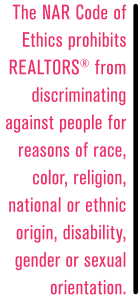Examining systemic racism and its effect on the arena of homeownership
By Myrna Traylor
The summer of 2020 has seen widespread protest about racial inequities. Many people are newly examining the underpinnings of systemic racism, which has frequently played out in the arena of homeownership.
 The National Association of REALTORS® (NAR) has urged its membership to make itself aware of potential pitfalls that could raise questions among buyers or sellers about equal treatment, which could be seen as a violation of the Fair Housing Act. Moreover, the NAR Code of Ethics also prohibits REALTORS® from discriminating against people for reasons of race, color, religion, national or ethnic origin, disability, gender or sexual orientation.
The National Association of REALTORS® (NAR) has urged its membership to make itself aware of potential pitfalls that could raise questions among buyers or sellers about equal treatment, which could be seen as a violation of the Fair Housing Act. Moreover, the NAR Code of Ethics also prohibits REALTORS® from discriminating against people for reasons of race, color, religion, national or ethnic origin, disability, gender or sexual orientation.
It is hard to imagine a REALTOR® being blatantly racist and refusing to work with a client who is Black, Hispanic or Asian. However, certain practices, such as steering, are still open to challenges of unfair treatment. “Steering” occurs when buyers are—subtly or otherwise—encouraged by a REALTOR® or even a mortgage lender to change which neighborhood they are looking at because of some perceived incompatibility due to race.
Gary Rossignol, with RE/MAX Preferred Group in West Chester near Cincinnati, Ohio, related the story of an African American couple who came to interview him. “They started telling me a story about how they had been trying to buy a house, and they had been with a couple of different REALTORS® and mortgage companies. They said, ‘They kept wanting us to buy in this particular neighborhood, [saying] “This is the right kind of neighborhood for you.” And we didn’t want to live there. We thought, is that right? Should we feel that way?’ I said, ‘No, if you feel awkward and insulted, you’re definitely not being treated fairly.’”
Other aspects of the client relationship might also be questioned, such as requiring an ID or proof of loan qualification for buyers of color when the same standards are not applied to white buyers.
Maximum civil penalties for violation of the Fair Housing Act as of 2020
First occurrence:
$21,410
Repeat violation within 5 years:
$53,524
Two or more violations in 7 years:
$107,050
Source: Federal Register, March 6, 2020. “Department of Housing and Urban Development, Adjustments of Civil Monetary Penalty Amounts for 2020.”
Sher Powers, owner/broker of Urbane Residential Specialists in Nashville, has launched a series of courses on race, diversity and inclusion that is geared toward helping REALTORS® recognize unconscious bias and “grow more comfortable with the uncomfortable conversation.” She advises REALTORS® to “treat every single client the same way. Have a written process. If you ask one person for ID, then ask every single person who walks in the door. From a safety standpoint it makes sense that you know who you’re actually working with, but from a discrimination standpoint, if you ask one person for qualifying documentation, ask them all. The same thing applies when a client comes in and says they want to see properties in a specific price point, within a certain radius of a particular address or community. Show them every single listing that is available within the parameters they’ve requested. Do not decide for them what neighborhood will be comfortable for them; let them lead the conversation—you gather the information.”
Facing reality
Discrimination in Denial Rates
The mortgage purchase denial rate for Black homebuyers is higher than the denial rate for the overall population of homebuyers in each of the nation’s 50 largest metros. On average, Black homebuyers are denied mortgages 12.64% of the time. This is 6.49% higher than the overall denial rate of 6.15%.
Source: Lendingtree
Owners of color can face difficulties when it comes time to sell. A recent story out of Jacksonville, Florida, described how a couple’s home was appraised at $130,000 lower than comparable homes in the neighborhood. When the owners removed photos of Black family members and persons of note and had the home re-appraised, the value went from $330,000 to $465,000—a 40% increase.
Maurice Taylor, a REALTOR® with the Coldwell Banker RPM Group in North Little Rock, Arkansas, understands that these kinds of things happen and prepares sellers for them. “We as agents—especially Black agents—have to be cognizant of that type of stuff. When I represent a Black family [selling], the first thing I tell them is take all your ethnic stuff down. They might not want to, but I tell them, ‘This is business, and you don’t want some appraiser to come in here and automatically devalue your property because you’re Black.’”
Are Special Lending Programs Helping?
Various mortgage lending programs designed to help minority homebuyers have cropped up over the years. But are they effective?
Steve Rath, broker with Better Homes Realty in Granite Bay, California, near Sacramento, has seen some of these programs over his 30-plus years in the business. “There were several programs that were geared toward buyers of color and helping out that population, just to get into first-time housing, and those programs seem to come and go,” Rath says. “It sounds like a good idea, like something that would be positive for the population, but then they fail, fall by the wayside or they don’t perform. And one of the reasons is that when you present that in an offer—especially if there are multiple offers or it’s a really good area—a lot of REALTORS® know, ‘If I accept that offer, it may cost more, I have to do these things, jump through those hoops.’ So that’s not as good an offer as just a typical FHA or conventional loan. It’s looked at in a negative light.”
Maurice Taylor of Coldwell Banker RPM Group in North Little Rock, Arkansas sees a different problem. “As an agent, you know that there are several special programs out there that will help people of color or people with lower credit scores. But when a buyer tells you the lender rejected them, you ask yourself, why didn’t they tell them about the program?”
To learn more, visit the Department of Housing and Urban Development at hud.gov.
Photo: iStock.com/SaulHerrera/filo








